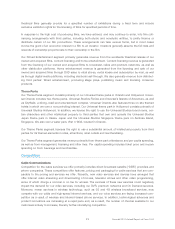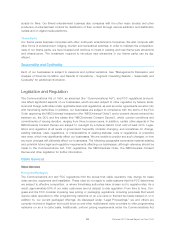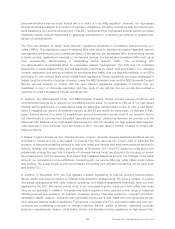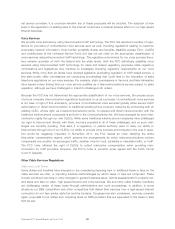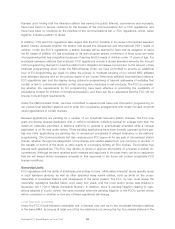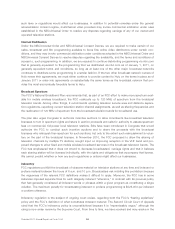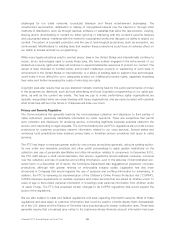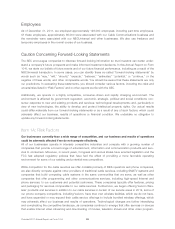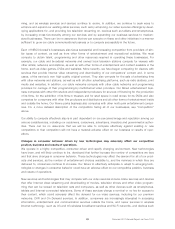Comcast 2011 Annual Report Download - page 23
Download and view the complete annual report
Please find page 23 of the 2011 Comcast annual report below. You can navigate through the pages in the report by either clicking on the pages listed below, or by using the keyword search tool below to find specific information within the annual report.
Cable Networks
Program Access
The Communications Act and FCC regulations generally prevent cable networks affiliated with cable oper-
ators, other than terrestrially-delivered programming networks, from favoring affiliated cable operators over
competing multichannel video providers, such as DBS providers and phone companies that offer multi-
channel video programming services, and limit the ability of these cable networks to offer exclusive
programming arrangements to affiliated cable operators. This restriction is scheduled to end on October 5,
2012, although the FCC will evaluate whether it should extend that date. In addition, FCC regulations allow
multichannel video providers to file program access complaints to try to show that their lack of access to a
terrestrially-delivered programming network has hindered significantly their ability to deliver video program-
ming to subscribers. Regardless of whether the FCC decides to sunset the exclusivity prohibitions in 2012,
we will be subject to program access obligations under the terms of the NBCUniversal Order.
The FCC launched a rulemaking in 2007 to consider whether companies that own multiple cable networks
should be required to make each of their networks available to multichannel video providers on a stand-alone
or “unbundled” basis when negotiating distribution agreements, although it has not further acted on that
rulemaking. We currently offer our cable networks on both a bundled and, when requested, on a stand-alone
basis. Increased regulatory requirements imposed on the manner in which we negotiate programming dis-
tribution agreements with multichannel video providers may adversely affect our cable networks business.
Under the terms of the NBCUniversal Order, multichannel video providers can invoke commercial arbitration
for program access pursuant to conditions adopted in the NBCUniversal Order against our cable networks,
including our regional sports and news networks. In addition, under the NBCUniversal Order and NBCUni-
versal Consent Decree, we are required to make certain of our cable, broadcast and film programming
available to bona fide online video distributors under certain conditions, and they may invoke commercial arbi-
tration pursuant to conditions adopted in the NBCUniversal Order and NBCUniversal Consent Decree to
resolve disputes regarding the availability of, and the terms and conditions of access to, such programming.
For more information on these conditions, see “Broadcast Television” below and refer to the “Must-Carry/
Retransmission Consent” discussion within that section.
Children’s Programming
The Children’s Television Act (“CTA”) and FCC regulations limit the amount and content of commercial matter
that may be shown on cable networks and broadcast networks during programming originally produced and
broadcast primarily for an audience of children under 13 years of age. The FCC is currently considering
whether to prohibit interactive advertising during children’s television programming. The NBCUniversal Order
includes certain commitments and conditions related to children’s television and advertising directed at chil-
dren, including commitments that we will not insert interactive advertising into children’s television
programming in any of the advertising spots we control, either as a multichannel video provider or as the
programmer, and that we will provide at least $15 million worth of public service announcements on child-
hood obesity, FDA nutritional guidelines, digital literacy, and parental controls per year until 2016.
Broadcast Television
Licensing
The Communications Act permits the operation of local broadcast television stations only in accordance with
a license issued by the FCC upon a finding that the grant of the license would serve the public interest, con-
venience and necessity. The FCC grants television broadcast station licenses for specific periods of time and,
upon application, may renew the licenses for additional terms. Under the Communications Act, television
broadcast licenses may be granted for a maximum term of eight years. Generally, the FCC renews broadcast
21 Comcast 2011 Annual Report on Form 10-K


